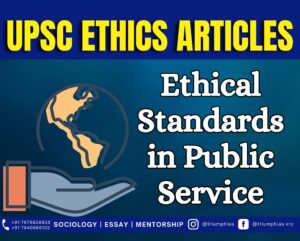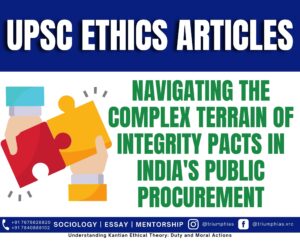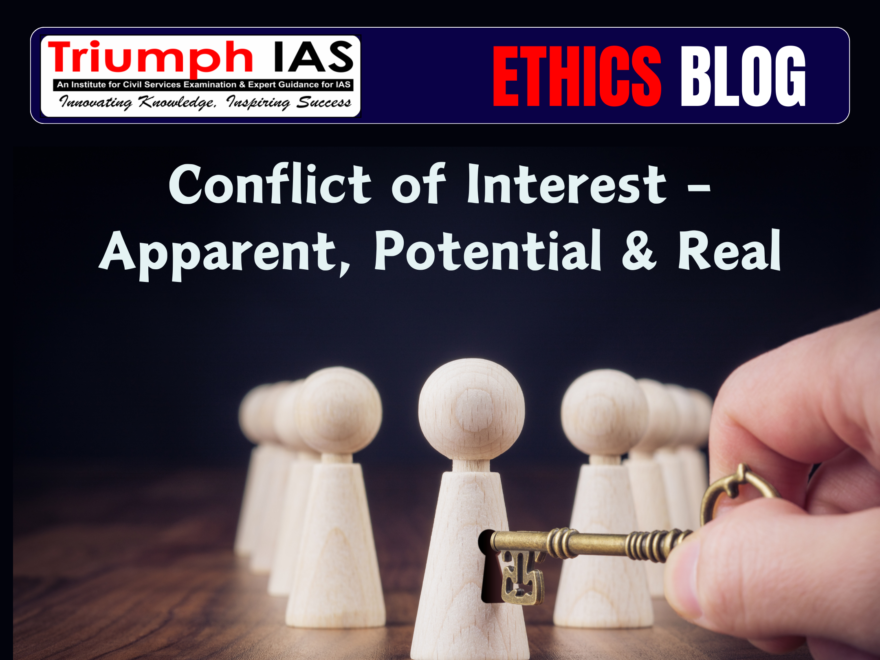Conflict of Interest–Apparent, Potential and Real
[Relevant for Public Ethics, Integrity and Aptitude]

Conflict of Interest (CoI) is “a situation in which a person, such as a public official, an employee, or a professional, has a private or personal interest “sufficient to appear to influence” the objective exercise of his or her official duties.”
Apparent And Potential Conflict Of Interests
An apparent conflict of interest is one in which a reasonable person would think that the professional’s judgment is likely to be compromised. A potential conflict of interest involves a situation that may develop into an actual or real conflict of interest.
So, one can say that apparent CoI precedes potential CoI and if certain conditions of proximity mature the same apparent becomes potential CoI. This potential CoI finally matures into actual CoI when it gets proved that ‘deal’ got done.
From, Apparent it moves to Potential and then finally to Actual.
Leading examples
With this in mind, consider the following types of typical conflict of interest listed by Canadian political scientists Ken Kernaghan and John Langford in their book, The Responsible Public Servant. They list seven categories:
[1] Self-dealing. For example, you work for government and use your official position to secure a contract for a private consulting company on you own.
[2] Accepting benefits. Bribery is one example; substantial [non token] gifts are another. For example, you are the purchasing agent for your department and you accept a case of liquor from a major supplier.
[3] Influence peddling. Here, the professional solicits benefits in exchange for using her influence to unfairly advance the interests of a particular party.
[4] Using your employer’s property for private advantage. This could be as blatant as stealing office supplies for home use. Or it might be a bit more subtle, say, using software which is licensed to your employer for private consulting work of your own. In the first case, the employer’s permission eliminates the conflict; while in the second, it doesn’t.
[5] Using confidential information. While working as revenue officer is privy to some government land acquisition in the near future or may be certain land post-mutation being converted from agricultural to mixed usage or from mixed usage to industrial/commercial. You quickly rush out and buy the land in your wife’s name to book profit later-on. One often comes Case Study related to this in exam. This goes further than mere land. Any type of government procurement involves certain asymmetrical information to officials working for that department. Improving upon Declaration of Asset Act 1983, the Lokpal Act 2013 mandates public servants to declare their assets and liabilities, and that of their spouses and dependent children. Such declarations must be filed by July 31st every year. They must also be published on the website of the Ministry by August 31st. But with an amendment in 2016 this has been diluted as post-amendment the Act will no longer require assets and liabilities of spouses and dependent children of public servants to be declared. It also removes the mandatory disclosure on the Ministry’s website.
[6] Outside employment or moonlighting. An example would be setting up a business on the side that is in direct competition with your employer. Another case would be taking on so many outside clients that you don’t have the time and energy to devote to your regular employer. In combination with [3] influence peddling, it might be that a professional employed in the public service sells private consulting services to an individual with the assurance that they will secure benefits from government: “If you use my company, I am sure that you will pass the environmental review.”
[7] Post-employment Here a dicey situation can be one in which a person who resigns from public or private employment and goes into business in the same area or joins a corporate office which has employed him only for his government connection. This we know by the manner in which BSNL/MTNL was completely routed from once being the best telecom service provider. In this context following the “cooling off” period post-retirement/VRS could be cited as one way in which this can be controlled.
#EthicsBlogoTerms
Related Blogs …
 |
 |
Follow us :



Find More Blogs…
| Compare and contrast Karl Marx’s and Max weber’s | Karl Marx- Historical Materialism |
| Position of Women In the Modern Indian Society | Sociology: Social system and pattern variables |



One comment